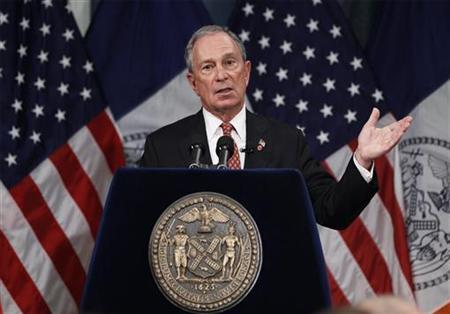(Reuters) – New York City Mayor Michael Bloomberg plans to propose a far-reaching municipal ban on sales of large-size sugary beverages by restaurants, mobile food carts, movie theaters and delis, his administration said on Wednesday.

A document outlining the proposal said it was aimed at fighting an epidemic of obesity, citing public health statistics showing that 58 percent of New York City adults and nearly 40 percent of city public school students are obese or overweight.
The proposal defines sugary drinks as beverages that are “sweetened with sugar or another caloric sweetener that contain more than 25 calories per 8 fluid ounces and contains less than 51 percent milk or milk substitute by volume as an ingredient.”
It would impact drinks sold in containers larger than 16 ounces, but would not impact the sale of diet soda or dairy-based drinks.
Americans consume 200 to 300 more calories every day than they did 30 years ago, according to the Bloomberg administration’s analysis.
Bloomberg has used the power of the city government to promote other health measures, including a campaign to cut down on salt and a ban on trans fats in restaurant food, as well as a requirement that chain restaurants display calorie counts.
In 2003, the city banned smoking in bars and restaurants, generating howls of protest at the time from smokers and non-smokers who saw it as a case of government creeping into private lives, but the law has since become widely accepted.
Bloomberg, a political independent, is in the middle of his third four-year term as New York City mayor.
The response to Bloomberg’s public health initiatives have been mixed. Earlier this month, a Quinnipiac University poll found that 45 percent of New York voters thought the government should discourage unhealthy eating and drinking habits, while 48 percent said the government shouldn’t get involved.
Still, many of those initiatives, including the smoking ban, have become models for other cities.
The proposed ban on sugary drinks requires the approval of the city’s Board of Health. It will be submitted to the board on June 12.
In a statement, a spokesman for the New York City Beverage Association challenged Bloomberg’s assertion that the consumption of soda was driving obesity rates.
“It’s time for serious health professionals to move on and seek solutions that are going to actually curb obesity,” said spokesman Stefan Friedman. “These zealous proposals just distract from the hard work that needs to be done on this front.”
(Reporting by Edith Honan and Steve Gorman; Editing by Cynthia Johnston and Eric Beech)





